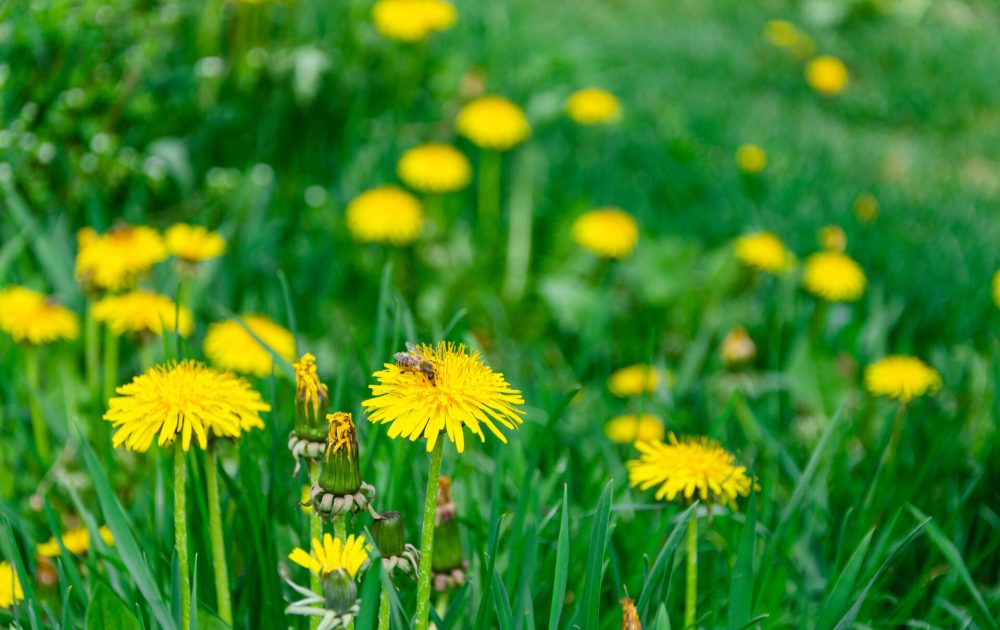Our test tells you which everyday chemicals you've recently come into contact with, and easy steps you can follow to reduce your exposure to them.
No Mow May

May sees the return of #NoMowMay a campaign to encourage us to leave the lawnmower in the garden shed throughout May. Its aim is to help the UK rebuild biodiversity of insects such as bees and other pollinators and plant species. According to the Journal Biological Conservation, 97% of British wildflower meadows have disappeared since the 1930s.
We cut our lawns on average every two weeks in the UK, and to keep weeds at bay, many people use lawn treatments that include herbicides including glyphosate. But when May ends, does that mean we should be aiming for perfect lawn again?
Letting your lawn grow naturally
Changing your mowing regime can help to increase biodiversity in your garden. Cutting less often such as once a month will increase the pollen count of your lawn. When you do cut, choosing a higher blade setting will not to disturb the roots of ‘short sword’ grasses and plants such as daises, which will grow back quicker after a cut and encourage more nectar for insects.
If you allow dandelions to grow, not only will they add a vibrant splash of colour, but they’ll also provide a good source of nectar for pollinators – just eight dandelion flowers produce enough nectar sugar to meet a bumblebee’s energy needs. You could try seeding some Yellow rattle which is a semi-parasitic plant that feeds off the roots of nearby grasses – so it’s a natural weed killer!
How to improve your lawn without using chemicals
Lawn treatments are abundant in the shops at this time of year, but many contain glyphosate, a widely used herbicide. This has been classified as “probably carcinogenic” to human health by the International Agency for Reasearch on Cancer (IARC).
Chemicals sprayed onto a lawn remain active for many months and can release vapours and enter our water supplies via groundwater runoff. They can be ingested via dermal contact or by ingestion, especially in areas where children might play. Children are at higher risk of health effects of exposure to pesticides due to their smaller bodies and developing organs. They also play and crawl around on lawns increasing skin and mouth contact, e.g., toys, shoes, clothing, lawn furniture or play areas.
The health risks of pesticides used on grass areas
There are many associated health risks of exposure to pesticides in lawns, so they are best avoided. Herbicides and pesticides are also thought to be one of the reasons for the increase in bee mortality and insect decline.
Streets, parks, and golf courses
Pesticides and herbicides are widely used in public areas. Golf courses cultivated for their greens use pesticides that could be absorbed via skin contact when picking up golf balls, tees or general equipment or transferred into the home via shoes and clothing, as well as inhaled during release from vapours.
Around 50 district councils have banned or pledged to ban the use of glyphosate in public areas. To check what’s happening in your area visit PAN UK.
Artificial grass is not a viable alternative
Artificial grass is growing in popularity because it’s easy to maintain and doesn’t require spraying to keep weeds at bay. But artificial grass and turf is made from plastic and has been linked with health risks such as cancer. The RHS banned artificial grass in its garden shows last year.
Alternatives to using pesticides in your garden
- Choose a wild area for your garden and leave it to thrive.
- Join #NoMowMay and choose an area in your garden to keep count of plants and insects.
- Plant a meadow instead of a lawn in an area of your garden.
- Shorter grass is more prone to insects, disease and drought.
- Use organic fertiliser and weeding methods.
- Make your own DIY weed killer using things like vinegar and salt/baking soda – there are plenty of recipes online!
- Pick out weeds by hand
- Join a community project to learn more about controlling weeds without using chemicals, such as the Weed Warrior scheme in Brighton and Hove.
- See weeds in a different light, many are great for wildlife and pollinators such as bees – they love lawn flowers and weeds such as dandelion. They are only weeds because we say they are.
- Ask your local golf course if it adopts pesticide free practices or is willing to do so.